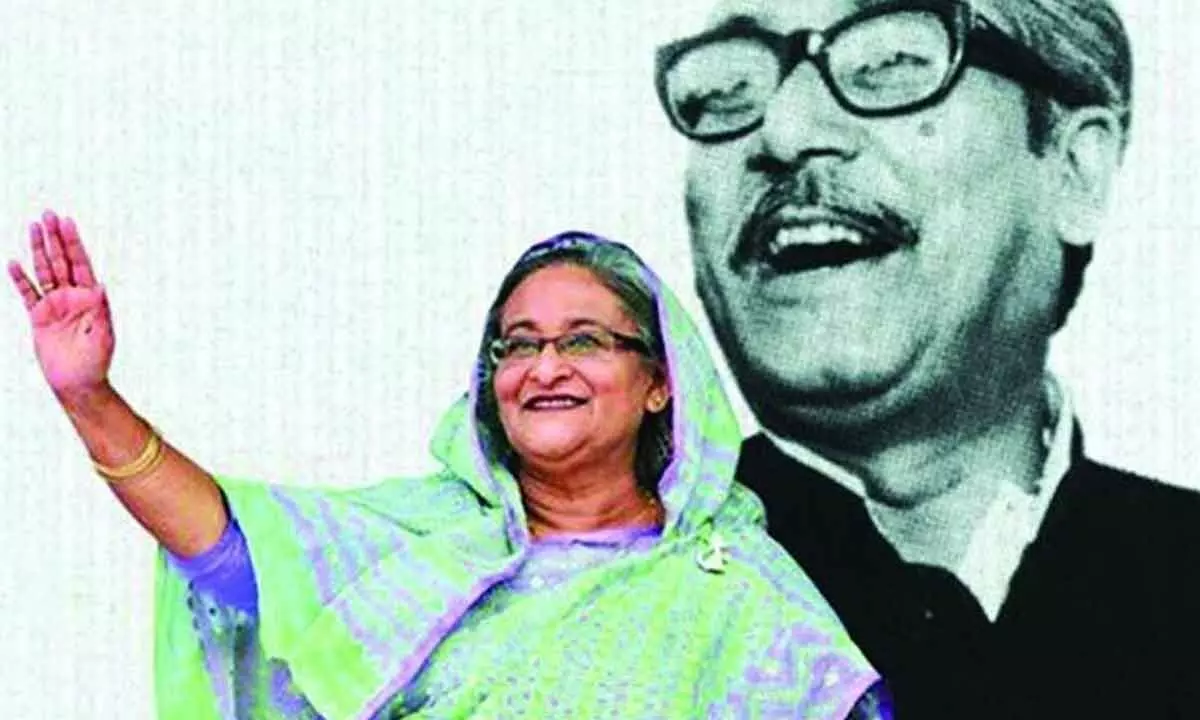Mujibur Rahman’s dream to make Bangladesh secular nation faces challenges
Bangladesh, born from the fight for Bengali identity in East Bengal, was a hard-fought victory. The liberation war witnessed the loss of millions of lives and the devastation of numerous villages. Brave Bangladeshis made sacrifices to defend the Bengali language against the forced imposition of Urdu
image for illustrative purpose

It is crucial for the present Prime Minister, Honourable Sheikh Hasina, bestowed with the title of Iron Lady of Asia by The Economist on May 24th, 2023, to tackle these concerns earnestly and promptly, with sincerity and urgency. By safeguarding the integrity of the Bengali language, upholding secular principles, and respecting the essence of the liberation war, she can honour her father's Bangabandhu Sheikh Mujibur Rahman legacy and the sacrifices of countless martyrs who fought for the creation of a secular Bangladesh
The birth of Bangladesh, carved from the struggle of East Bengal, was a hard-won victory. The Liberation war exacted a heavy toll, claiming millions of lives and leaving countless villages in ruins. Yet, amidst the brutality, the indomitable spirit of the Bangladeshi people prevailed. This cherished independence is a testament to their resilience.
Numerous courageous individuals, among them martyrs like Dhirendranath Datta, Nurul Huq Bhuiyan, Shafiur Rahman, Pearu Sardar and many more, made the ultimate sacrifice to uphold the dignity of the Bengali language. The pivotal Language Movement of 1952, spurred by the imposition of Urdu as an official language of Pakistan following the partition of India in 1947, symbolizes this struggle. Despite being the predominant language spoken in East Bengal, Bengali was sidelined, igniting a fervent movement to preserve its significance and cultural identity.
Sheikh Mujibur Rahman, the founding father of Bangladesh, endured nine months of imprisonment by West Pakistan—a testament to his unwavering commitment to the cause of independence. His sacrifice symbolizes the pinnacle of the nation's struggle and the ultimate realization of freedom for the people of Bangladesh. Bangabandhu, a towering figure in Bangladeshi history, epitomized the spirit of resilience and determination. Bangabondhu Mujibur Rahman's leadership was deeply influenced by the ideals and principles of another great Indian freedom fighter, Netaji Subhas Chandra Bose. In his unfinished autobiography, "Oshomapto Atmajiboni," he recounts a childhood fascination with Netaji, a sentiment fueled by the revolutionary's fiery words: "We will achieve freedom through sacrifice and protect it with our own power.
This early inspiration propelled Bangabandhu into activism. At the tender age of 16, amidst the Swadesi Movement led by Netaji Subhas Chandra Bose, he fervently embraced the cause, fueled by a deep-seated resentment towards British colonial rule. His time in Kolkata deepened his understanding of Netaji's ideology. Bangabandhu admired Netaji's leadership for its inclusivity. The creation of a unified Indian liberation force, transcending religious divides, solidified Bangabandhu's belief in Netaji's non-communal vision. "The leader who leaves his homeland for his nation's freedom," Bangabandhu wrote, "can never be communal." This unwavering respect for Netaji's selflessness and dedication became a cornerstone of Bangabandhu's own leadership journey.
Mujibur Rahman's admiration for Netaji was evident in his actions and rhetoric. Just as Netaji strove for India's independence, Mujibur Rahman fought tirelessly for the liberation of Bangladesh from Pakistani rule. His slogan "Joy Bangla" resonated with the fervor of Netaji's "Joy Hind," symbolizing the aspiration for freedom and self-determination.
In the year 1972, the Prime Minister of newly independent Bangladesh, father of the Nation Bangabandhu Sheikh Mujibur Rahman visited Kolkata in 1972 and paid homage to his ideal man on the portrait of Netaji on Red Road. Bangabandhu and Netaji both are identical in character and patriotism. Both the leaders suffered for the interest of the nation. They both were uncompromising and straight-forward. They did not bow their heads to oppression and exploitation.
Deshbandhu Chittaranjan Das, Netaji Subhash Chandra Bose, and Bangabandhu Sheikh Mujibur Rahman exemplify unwavering dedication to their principles. Amidst perilous circumstances, they steadfastly advocated for the rights of their people. Their steadfast commitment to secularism remains integral to their legacies. In a 2004 BBC opinion poll, Bangabandhu Sheikh Mujibur Rahman (Mujib) was acclaimed as the greatest Bengali of all time, securing the top position due to his embodiment of secularism, love, and genuine commitment to liberating East Bengal from oppression and violence.
Bangladesh, born from the fight for Bengali identity in East Bengal, was a hard-fought victory. The liberation war witnessed the loss of millions of lives and the devastation of numerous villages. Brave Bangladeshis made sacrifices to defend the Bengali language against the forced imposition of Urdu. Today, Bangladesh, a nation founded on secular principles, faces challenges. Concerns persist regarding influences such as the increased use of Urdu and Farsi, the rise of hijab culture, and potential shifts away from the secular nature of the nation. These developments, if realized, could be interpreted as deviations from the ideals advocated by the heroes of the Liberation War and Bangabandhu Sheikh Mujibur Rahman's vision for Bangladesh.
It is crucial for the present Prime Minister, Honourable Sheikh Hasina, bestowed with the title of Iron Lady of Asia by The Economist on May 24th, 2023, to tackle these concerns earnestly and promptly, with sincerity and urgency. By safeguarding the integrity of the Bengali language, upholding secular principles, and respecting the essence of the liberation war, she can honour her father's Bangabandhu Sheikh Mujibur Rahman legacy and the sacrifices of countless martyrs who fought for the creation of a secular Bangladesh. Joy Hind.
(The author is Social Worker & General secretary, Bongo Bhashi Mahasabha Foundation, India)

